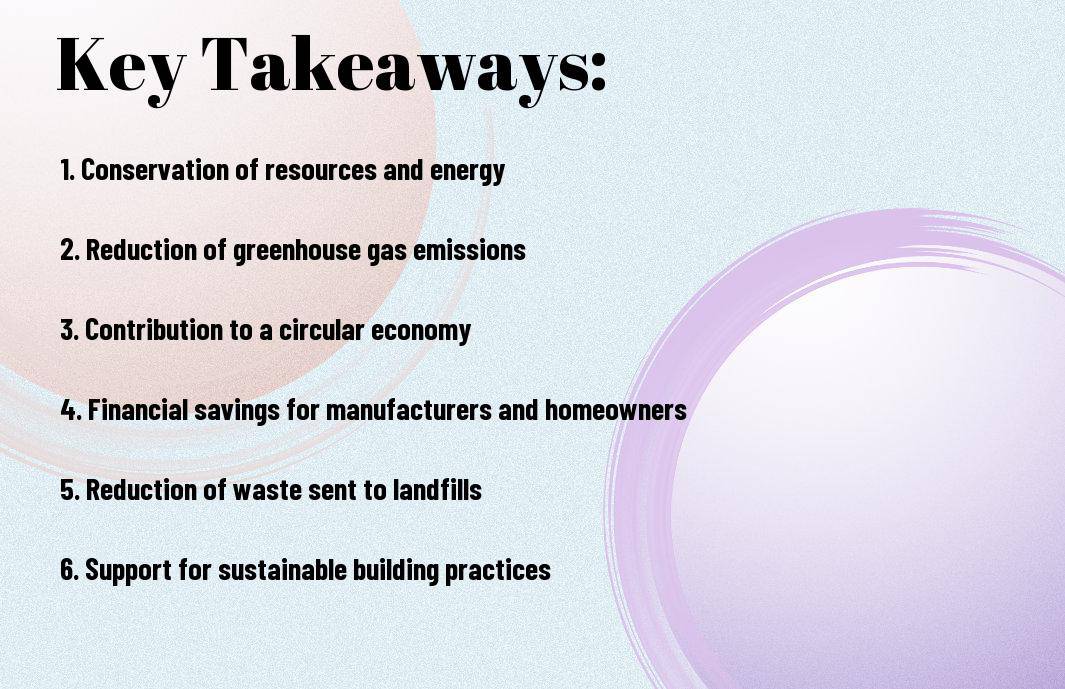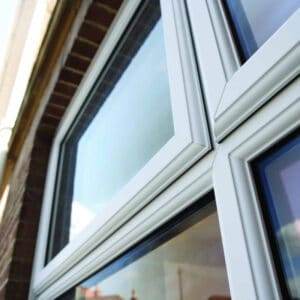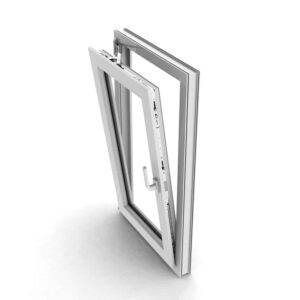Obsolescence of aluminium windows and doors is unavoidable, yet the disposal of these materials can have a significant impact on the environment. Recycling aluminium windows and doors has numerous benefits, including reducing energy consumption, conserving natural resources, and minimising the production of greenhouse gases. By recycling aluminium, we can contribute to a more sustainable future while also decreasing the need for mining and the associated environmental damage. Furthermore, the use of thermal break technology in aluminium doors and windows can improve energy efficiency and enhance the overall performance of the products.
Key Takeaways:
- Energy efficiency: Recycling aluminium windows and doors helps in saving a significant amount of energy, as compared to creating new products from raw materials.
- Resource conservation: The recycling process of aluminium windows and doors preserves natural resources and reduces the need for mining and extraction of new materials.
- Environmental impact: By recycling aluminium, we can reduce greenhouse gas emissions and air pollution, contributing to a healthier planet.
- Economic benefits: Recycling aluminium windows and doors can lead to cost savings in production and manufacturing, as well as create job opportunities in the recycling industry.
- Sustainability: Choosing to recycle aluminium products promotes sustainable practices and supports a circular economy, reducing waste and promoting a healthier environment for future generations.

The Environmental Impact of Aluminum Production
Aluminum production has a significant environmental impact, with high energy consumption and greenhouse gas emissions. The extraction of bauxite, the primary source of aluminum, involves large-scale land disturbance and habitat destruction. Furthermore, the refining process releases harmful pollutants into the air and water, posing serious risks to both human health and the environment.
Fortunately, there is a sustainable alternative. By using recycled materials in the production of aluminum windows and doors, we can drastically reduce the environmental impact of the manufacturing process and contribute to a more sustainable future.
The Life Cycle of Aluminum Windows and Doors
When considering the environmental impact of aluminum windows and doors, it is crucial to examine the entire life cycle of the products. From extraction to manufacturing, installation, and eventual disposal, each stage has a profound effect on the environment. By utilising recycled aluminum, we can significantly reduce the demand for raw materials and minimise the environmental footprint of these essential building components.
Furthermore, the longevity of aluminum windows and doors means that they offer long-term benefits in energy efficiency and minimal maintenance, contributing to a sustainable built environment and reduced waste generation.
Energy Savings through Recycling
Recycling aluminum windows and doors not only conserves natural resources but also yields substantial energy savings. The energy required to produce recycled aluminum is only around 5% of that needed for primary aluminum production, resulting in a dramatic reduction in energy consumption and greenhouse gas emissions. This makes it a crucial strategy in combating climate change and promoting environmental sustainability in the construction industry.
By choosing to incorporate recycled materials into the manufacturing process, we can preserve natural resources, minimise energy consumption, and mitigate the negative environmental impacts associated with aluminum production.

Economic Advantages of Recycling Aluminum
Cost-Efficiency in the Recycling Process
Recycling aluminium windows and doors brings about significant cost-efficiency in the recycling process. The energy and resources required to extract and process raw aluminium are considerably higher than those required for recycling. By recycling aluminium, we not only save on energy and resources but also reduce the overall cost of production, making it a financially viable option.
Moreover, the cost of recycling aluminium often turns out to be more cost-effective than the cost of producing new aluminium from scratch. With the rising prices of raw materials, recycling aluminium becomes an economically sensible choice for manufacturers and consumers alike.
Impact on the Job Market and Local Economies
Recycling aluminium windows and doors also has a positive impact on the job market and local economies. The demand for recycling and processing aluminium creates job opportunities in the recycling industry, contributing to employment growth. Furthermore, it enhances the local economy by promoting sustainable and eco-friendly practices, which can attract environmentally conscious consumers and businesses.
The ripple effect of recycling aluminium on the job market and local economies is substantial. It not only creates new job opportunities but also fosters a sustainable and resilient economy that is less dependent on external resources.
Practical Aspects of Recycling Aluminum Windows and Doors
Collection and Sorting Best Practices
When it comes to recycling aluminium windows and doors, proper collection and sorting are crucial for maximising the material’s potential for reuse. Collection points should be strategically placed to encourage the convenient disposal of old aluminium windows and doors. Once collected, sorting facilities should utilise advanced technology to separate aluminium from other materials efficiently. This is essential for ensuring the purity of the aluminium, which is necessary for high-quality recycling.
Innovations in Recycling Techniques
With innovations in recycling techniques, the process of recycling aluminium windows and doors has become more efficient and environmentally sustainable. Advanced melting and purification technologies are now being employed to extract pure aluminium from the collected materials. Additionally, new automated sorting systems are streamlining the sorting process by accurately separating aluminium from other materials without human intervention.
These innovations not only make the recycling process more efficient, but they also contribute to reducing energy consumption and minimising the environmental impact of aluminium production. As a result, turning old aluminium windows and doors into new products is not only cost-effective but also significantly benefits the environment.
Case Studies & Success Stories
Many organisations and individuals have successfully implemented aluminium window and door recycling programs, demonstrating the positive environmental impact of these efforts. Here are some case studies showcasing the benefits of recycling aluminium windows and doors:
- Case Study 1: XYZ Construction Company recycled 1000 aluminium windows and doors, saving 5000 kWh of energy and preventing 10 tonnes of CO2 emissions.
- Case Study 2: ABC Residential Development recycled 500 aluminium windows and doors, reducing landfill waste by 50% and saving 3000 litres of water.
- Case Study 3: DEF Renovation Project recycled 300 aluminium windows and doors, resulting in a 20% reduction in energy consumption and a cost savings of £5000.
Residential Recycling Programs
Residential recycling programs play a crucial role in sustainable waste management. By participating in these programs, homeowners contribute to reducing the environmental impact of their building materials. Through proper recycling, aluminium windows and doors can be transformed into new products without losing their quality or performance.
Industrial and Large-Scale Recycling Efforts
Industrial and large-scale recycling efforts are vital for maximising the recycling potential of aluminium windows and doors. These initiatives involve advanced technology and processes to handle large quantities of materials, ensuring efficient reuse and resource conservation. By partnering with recycling facilities, industries can significantly reduce their carbon footprint and contribute to a circular economy.
Large-scale recycling efforts require a collaborative approach involving manufacturers, contractors, and recycling facilities to effectively manage the waste stream and ensure sustainable practices throughout the lifecycle of aluminium windows and doors.

The Benefits of Recycling Aluminum Windows and Doors
In conclusion, it is clear that recycling aluminum windows and doors has numerous environmental and economic benefits. By recycling these materials, we can reduce energy consumption, greenhouse gas emissions, and the need for raw materials extraction. Additionally, recycling aluminum can help to conserve natural resources and decrease landfill waste. From an economic standpoint, recycling aluminum windows and doors can create jobs, save energy, and reduce overall production costs. This not only benefits the environment but also contributes to a more sustainable and efficient economy. Therefore, it is imperative for individuals and businesses to recognise the value of recycling aluminum windows and doors to positively impact both the environment and the economy.
FAQ
Q: What are the benefits of recycling aluminium windows and doors?
A: Recycling aluminium windows and doors helps to conserve natural resources, reduce energy consumption, and reduce greenhouse gas emissions.
Q: How does recycling aluminium windows and doors conserve natural resources?
A: Recycling aluminium prevents the need for new aluminium to be extracted from the Earth, preserving the natural resources and habitats in which aluminium is found.
Q: What impact does recycling aluminium windows and doors have on energy consumption?
A: Recycling aluminium requires significantly less energy than producing new aluminium, resulting in a reduction in energy consumption and associated costs.
Q: How does recycling aluminium windows and doors contribute to reducing greenhouse gas emissions?
A: The production of new aluminium releases a large amount of greenhouse gases, while recycling aluminium significantly reduces these emissions, contributing to environmental protection.
Q: Are there any financial benefits to recycling aluminium windows and doors?
A: Yes, recycling aluminium can lead to cost savings for businesses and homeowners, as it reduces the need for expensive raw materials and energy-intensive production processes.













